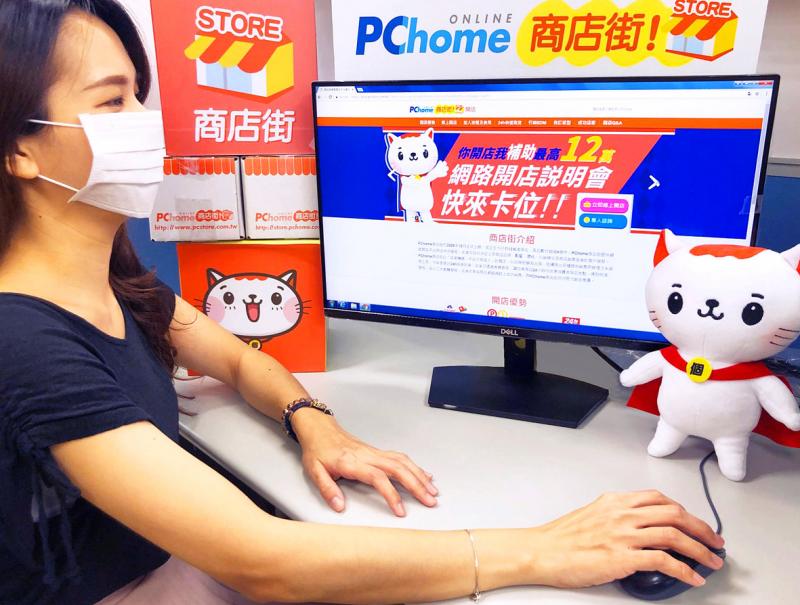Logistics and warehouse capacity would be the keys to determining the success of e-commerce retailers, the Market Intelligence & Consulting Institute (MIC, 產業情報研究所) said yesterday.
Although the COVID-19 pandemic has cast a shadow over the retail sector, it has allowed the e-commerce industry to shine.
E-commerce sales in Taiwan surged 16.5 percent year-on-year in the first quarter, while sales across the wider retail sector contracted by 0.6 percent.

Photo courtesy of PChome Online Inc
Pointing to the nation’s two largest e-retailers — PChome Online Inc (網路家庭) and Momo.com Inc (富邦媒體) — the institute said that the race to build bigger warehouses and to improve logistics management is on.
“Taking a look at their [PChome and Momo] performances last quarter, we can clearly see that the nature of the competition has changed from a focus on boosting merchandise quantity to lowering logistics costs and expanding warehouse capacity,” MIC e-commerce industry consultant and director Wang Yi-chih (王義智) told an online forum.
The company that “has a strong logistics and warehouse system will have the highest chance of winning,” Wang said.
PChome reported that sales grew 16.05 percent year-on-year to NT$10.68 billion (US$357.13 million) in the first quarter, while Momo posted a 28.72 percent growth in sales to NT$15.11 billion.
“Logistics is one of the most important pillars supporting the e-commerce industry,” and major players have been setting up their own fleets, Wang said.
Seeking to ensure fast deliveries, Momo last month set up a new logistics subsidiary, Fu Sheng Logistics Co (富昇物流), which has a fleet of 200 couriers and more than 100 vehicles.
PChome is one step ahead, having established PChome Express Co (網家速配) in 2018, which has 250 couriers and 200 vehicles.
The importance of logistics in the development of e-commerce has been further highlighted by the recent surge in demand for food deliveries, Wang said.
As an increasing number of customers choose to eat at home, more e-commerce operators are offering fresh produce and frozen food on their platforms, which require fast delivery, he said.

CHIP WAR: Tariffs on Taiwanese chips would prompt companies to move their factories, but not necessarily to the US, unleashing a ‘global cross-sector tariff war’ US President Donald Trump would “shoot himself in the foot” if he follows through on his recent pledge to impose higher tariffs on Taiwanese and other foreign semiconductors entering the US, analysts said. Trump’s plans to raise tariffs on chips manufactured in Taiwan to as high as 100 percent would backfire, macroeconomist Henry Wu (吳嘉隆) said. He would “shoot himself in the foot,” Wu said on Saturday, as such economic measures would lead Taiwanese chip suppliers to pass on additional costs to their US clients and consumers, and ultimately cause another wave of inflation. Trump has claimed that Taiwan took up to

A start-up in Mexico is trying to help get a handle on one coastal city’s plastic waste problem by converting it into gasoline, diesel and other fuels. With less than 10 percent of the world’s plastics being recycled, Petgas’ idea is that rather than letting discarded plastic become waste, it can become productive again as fuel. Petgas developed a machine in the port city of Boca del Rio that uses pyrolysis, a thermodynamic process that heats plastics in the absence of oxygen, breaking it down to produce gasoline, diesel, kerosene, paraffin and coke. Petgas chief technology officer Carlos Parraguirre Diaz said that in

Japan intends to closely monitor the impact on its currency of US President Donald Trump’s new tariffs and is worried about the international fallout from the trade imposts, Japanese Minister of Finance Katsunobu Kato said. “We need to carefully see how the exchange rate and other factors will be affected and what form US monetary policy will take in the future,” Kato said yesterday in an interview with Fuji Television. Japan is very concerned about how the tariffs might impact the global economy, he added. Kato spoke as nations and firms brace for potential repercussions after Trump unleashed the first salvo of

SUPPORT: The government said it would help firms deal with supply disruptions, after Trump signed orders imposing tariffs of 25 percent on imports from Canada and Mexico The government pledged to help companies with operations in Mexico, such as iPhone assembler Hon Hai Precision Industry Co (鴻海精密), also known as Foxconn Technology Group (富士康科技集團), shift production lines and investment if needed to deal with higher US tariffs. The Ministry of Economic Affairs yesterday announced measures to help local firms cope with the US tariff increases on Canada, Mexico, China and other potential areas. The ministry said that it would establish an investment and trade service center in the US to help Taiwanese firms assess the investment environment in different US states, plan supply chain relocation strategies and